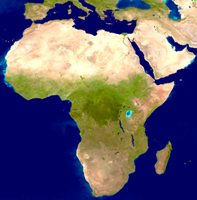 Bharat Sanchar Nigam Ltd chairman Kuldeep Goyal has been trying to get a foothold in Africa since February this year when the government allowed the state-owned giant to pursue business opportunities in that continent.
Bharat Sanchar Nigam Ltd chairman Kuldeep Goyal has been trying to get a foothold in Africa since February this year when the government allowed the state-owned giant to pursue business opportunities in that continent.
The five-month old search continues; Goyal says BSNL is looking at acquiring stakes or licences in African markets as and when they are put up for sale.
BSNL has tough competition. And Bharti Airtel, which is in exclusive talks for a share swap deal with the MTN Group, is not the only one threatening to steal a march over it in this African safari.
A host of Indian companies have joined the queue -- Mahanagar Telephone Nigam Ltd, another state-run firm, is also evaluating a proposal to acquire a company that has licences in five African nations.
And the Essar group is in talks with Warid Telecom, which owns GSM networks in Congo and Uganda and Cote d'Ivoire (West Africa), to pick-up a substantial stake in the company. Warid Telecom is a subsidiary of the Dubai-based Dhabi Group, controlled by the country's royal family. Essar already owns a licence in Uganda to build a $200-million (Rs 950 crore) cellular phone network through a joint venture with Kenyan Telecom Uganda Ltd.
Even the Anil Ambani group, which made an unsuccessful attempt to acquire MTN last year, is believed to be keen on strengthening its destination African strategy.
Why are Indian companies so eager to connect with Africa? The reason is simple: According to an Ernst & Young report, Africa's mobile phone market has been growing twice as fast as Asia over the past several years. Besides, the average revenue per user in India has been declining -- the blended ARPU for GSM operators stand at Rs 209 and that for CDMA players are at Rs 99 per month. Compare that with Africa where the average ARPU is $12 (Rs 576) as in June.
There's more. The average tele-density in Africa is less than 10 per cent (38.88 in India) -- in fact, less than 2 per cent in some countries -- so the potential for growth is huge. For example, Vodafone Plc posted a 100 per cent growth in revenues from African markets during the first quarter ended June 30, 2009. The Newbury-based company's organic service revenues from India (based on currency of that particular country) grew 23 per cent.
GSM Association (GSMA) senior director (services) Jaikishan Rajaraman says Indian telecom companies are aspiring to become multinationals. More importantly, the Indian market is saturated and competition will intensify with new telecom licensees expected to start operations.
Frost & Sullivan Deputy Director ICT Practice (South Asia & Middle East) Girish Trivedi says African markets are the best bet for Indian firms to grow telecom revenues and record decent return on investments. Besides, African countries are also opening up to foreign companies as the governments have realised that telecom growth is necessary for economic growth, so many countries are expected to auction licences and spectrum soon.
More importantly, for Indian telcos the African market in many ways is similar to that of India and the distribution and marketing challenges are easier to handle compared to MNCs in Europe and the US. "We operate with the lowest tariffs, the lowest ARPUs, sell minutes as commodities and have a low cost network expansion model. All this will work perfectly in Africa" says a senior executive of a leading Indian company.
Idea Cellular Managing Director Sanjeev Aga says scarcity of spectrum, the radio frequencies that enable mobile communication, could be another issue prompting companies to look overseas. With most of the companies being under served on spectrum (some companies have only start-up 2G spectrum) and no clarity on 3G spectrum, overseas markets are emerging as the next destination.
Yet, Idea Cellular has no immediate overseas plans. "We have to complete our pan-India expansion before we can take a call on overseas markets," he says.






